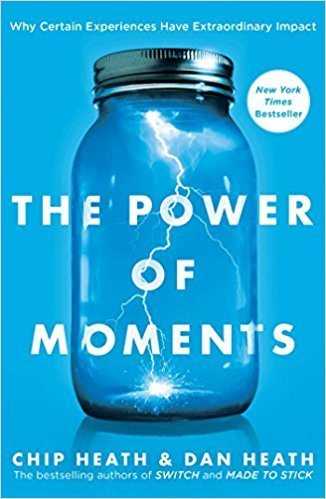The Book In A Single Sentence
Every experience that we’ve ever had are defined by small moments which we don’t notice, but are actually key to how we perceive an event.
Get The Power of Moments on Amazon.
Personal Thoughts
The Power of Moments is another great book by the Heath brothers. An underappreciated fact is that our entire experiences can be shaped by single moments. If you want to have a great time doing something, start by focusing on small moments. This book teaches you exactly how to do that.
Book Notes
- We all have defining moments in our lives. But we don’t have to wait for it to happen to us. We can create our own experiences.
- Every peak moment has one of the following EPIC elements: elevation, pride, insight, connection. The authors have avoided using this acronym to avoid making this too cheesy, but hey, we’ll take whatever we can get to ensure that we remember this.
- The Peak-End Rule: we remember peak moments and the end more vividly than other moments.
- There are three situations which most deserve our attention. They are transitions, milestones, and pits. If you can capture meaning in these instances, they will become extraordinary.
- We have a natural hunger for landmarks in time. Take birthdays and the New Year. People make plans around these two events. But what if there were other milestones which go ignored? It makes more sense to celebrate achievement than the passing of time.
- “To maximise customer satisfaction, you don’t want to be perfect. You want to get two things wrong, have the customer bring those mistakes to your attention, and then hustle like mad to fix those problems.”
- Elevate by raising the stakes: “In sports, there’s a game, and it’s in front of an audience. We run school like it is nonstop practice. You never get a game. Nobody would go out for the basketball team if you never had a game. What is the game for the students?”
- Life is filled with invisible scripts. How we spend Sundays, how meetings go, how hotel check-ins work. Peak moments occur when someone breaks the script. Randomness and surprise work; they are necessary for an experience to be remarkable.
- Breaking the script creates powerful moments. The analytics group calculated that if Southwest could double the number of customers hearing a funny flight safety announcement, the result would be more than $140 million in revenue. That’s more than the cost of two 737s.
- 6 out of the 10 most important events happen during a relatively narrow window of time from the ages of 15 to 30. Psychologists call this the “reminiscence bump”. Experiences such as falling in love, beginning school, graduation are all novel. It’s no wonder that the later experiences in life are thought to be less remarkable since we’ve pretty much done it all by then. The bar is a lot higher.
- Pride: Multiply the number of milestones en route to a goal. It’s a forward-looking strategy since it creates moments of pride ahead, but it also surfaces milestones we’ve already met but might not have noticed. A long race with one endpoint can become more meaningful with multiple milestones where there are many intermediate finish lines.
- Courage cannot just be taught, it must be practised as well. The military trains its soldiers to undertake dangerous jobs by putting them in real-time simulations. The successful practice of courageous performance in these practices led to a reduction in fear and bolstering of confidence.
- Insight is important: “When you have a sudden realisation, one that you didn’t see coming, and one that you know viscerally is right, you’ve tripped over the truth. It’s a defining moment that in an instant can change the way you see the world”.
- Don’t sacrifice the remarkableness of an action or experience by giving in to the force of reasonableness. Thinking in terms of efficiency or scale takes away from the power of an experience.
- Connection is created in social moments. Meaning doesn’t come from just the inherent value of an experience. An experience can become memorable and meaningful just by having others present.
- Something is meaningful because others think so as well. Milestones like birthdays and the New Year are social constructs. Collectively, we’ve decided that these events are important.
- Most laughter comes not from hearing funny things. It’s a social reaction that is concerned more about relationships than humour. Laughing tells the group, “I’m with you. I’m part of your group”. This is why laughter is 30 times more common in social settings than private ones.
- Purpose trumps passion. Passion is individualistic. It can energise us but it also isolates us because my passion isn’t yours. In contrast, purpose is something that people can share. It knits groups together.
- “We can be the designers of moments. These extraordinary minutes and hours and days – they are what make life meaningful. And they are ours to create.”
